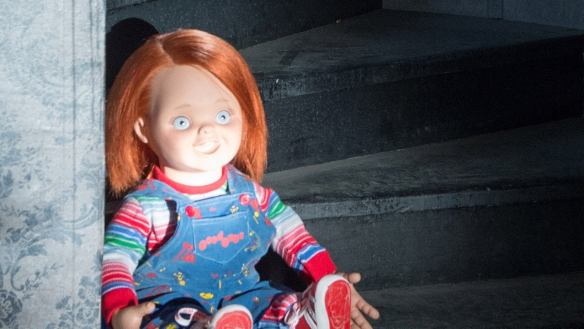Hello folks, and welcome back to Wrong Every Time. This week I’ve continued to munch through the original Slayers series, though my progress has been admittedly slow of late. There’s a good reason for that, though – after initially setting a new year’s resolution of spending one day writing personal fiction per week, I’ve lately been upping my output dramatically, spending my evenings banging away at what is increasingly appearing to be some kind of actual book. It has been immensely fulfilling to get back into consistent creative writing, and I imagine I’ll have some updates on that front soon, but for now, we’ve got some films to explore. Let us conclude our journey through the Chuckyverse!
With the manifestly ludicrous adventures of Chucky and Tiff having apparently surpassed the public’s stomach for this sort of shit, the Chucky franchise entered a period of hibernation for the next decade, before resurfacing with the quasi-reset Curse of Chucky. This entry strips the franchise back to its original fundamentals, focusing on a pair of sisters (Fiona Dourif and Danielle Bisutti) who are divided on what to do with their old family home. Complicating this situation is the mysterious recent arrival of a Good Guy doll, presaging a long night of mayhem and murder.
All the principles are once again in attendance, with Mancini writing and directing, Kirschner producing, and Dourif now joined by his daughter as the wheelchair-bound protector of her family home. These lean fundamentals (and the contours of their Hill House-ass manor) facilitate a marvelous procession of constrained pressure cookers, as Chucky closes in on one or another member of the family.
Curse of Chucky crucially abandons the long, slow process of the central character being conscious of the danger but disbelieved by everyone else; we’re reveling in gooey payoff by the thirty minute mark, and the challenges here are more physical and fundamental – “can our heroine escape this gas-filled garage,” “can she outmaneuver Chucky within the confines of the manor elevator,” etcetera. Constructed with great love for the franchise’s roots yet a clear understanding of which ideas have run their course, Curse of Chucky feels like an oddly heartwarming family reunion – not for the luckless souls caught on camera, but for the committed team that have kept this franchise alive for decades.
That sense of a loving family reunion goes double for the franchise’s final film entry, Cult of Chucky. This one sees our survivor Fiona Dourif held in a mental institution, still recovering from the guilt of allegedly killing her family. This provides a perfect opportunity for Chucky to return to his gaslighting ways, facilitated by a truly Nurse Ratched-worthy doctor and a returning Jennifer Tilly. Even our long-suffering original survivor Andy (Alex Vincent) pops back up, for an excursion that celebrates all of this franchise’s off-kilter indulgences.
Yep, this one is “Chucky Flew Over the Cuckoo’s Nest,” an obvious concept that this reliable team knocks clear out of the park. Tilly and Vincent rise from cameos to costars, Brad Dourif is as delightful as ever, and Fiona once again proves herself a dynamic, resilient heroine with much of her father’s keen facial control. As with its predecessor, location is key here – we’re still working on a much smaller scale than the excess of the original Tilly era, but the sheer white hallways of this mental institute prove as disconcerting in their own way as the gothic excess of the previous film.
Cult of Chucky succeeds as a traditional Chucky feature, as a celebration of the franchise’s enduring cast and crew, and as one final innovative indulgence, offering several sequences that feel like franchise-long payoffs. I really thought I’d seen it all once we hit a sequence of several Chuckies bickering amongst themselves, but the film’s last flourish feels like the justification for this revival altogether: Fiona Dourif playing her own father playing Chucky, and absolutely demolishing the role. I never expected to say this, but Chucky is indeed the most reliable, most compelling of the great slasher empires.
Our next viewing was Predestination, a scifi thriller featuring Ethan Hawke as a time-traveling agent tasked with hunting down the “Fizzle Bomber,” a terrorist who has persistently evaded them. After Hawke’s character is badly burned in his latest attempt to catch the killer, he is given a new face and a final mission. His first task: pose as a bartender and listen to the strange, winding life story of a local patron (Sarah Snook), as he prepares for the unthinkable, inevitable future.
Based on an acclaimed Robert Heinlein short story, Predestination is one of vanishingly few time travel stories that actually work, at least according to their own logic. It offers one particular “chicken and egg” origin paradox, and aside from that embraces the sad inevitability that if time travel existed, it would already all have been done – we would all currently exist in the final orientation of reality, because all time travel to times before us would have already occurred, leaving us in our final, inevitable destinations.
All of that can be deduced by simply thinking about time travel for long enough, and I certainly have to commend Heinlein for having done that work beforehand. What makes Predestination succeed as a drama is that it actually tethers the tragic inevitability of time travel to its personal stories, making both Hawke and Snook’s journeys feel first hopeless, then desperate, then inevitable as the pieces lock into place. Hawke is as reliable as ever, but Snook is a revelation here, grounding the film in relatable reactions and a profound sense of loss even as the circular circumstances of her character journey become increasingly outlandish. “Time travel can’t save us because everything that would have happened already has” is a clever, cute deduction – “the inevitability of time travel’s failure echoes the inevitability of personal regret, and of one day no longer recognizing the person in the mirror” is an idea worth building a mean little film out of.
We then returned to martial arts with Double Dragon, an adaptation of the beloved side-scrolling beat-em-up. And if that’s not significant enticement, what would you say if Double Dragon was also spearheaded by the very man who directed Genesis’ music video for the iconic “That’s All”? Appetite sufficiently whetted yet?
Alright, yeah, Double Dragon’s script is nonsense and performances amateurish, but I honestly still had a fine time with it. The film is crucially blessed with a delightful vision of post-apocalyptic Los Angeles; though it came out in ‘94, it’s still driven by the aesthetics and anxious worldview of ‘80s crime wave films like The Warriors and Escape From New York. Technicolor gangs roam the streets, cops cower at the sight of superpowered mutants, and only a pair of high-kicking, fast-talking teens can save the day.
If you’ve any nostalgia for those ‘80s anxieties and their accompanying luxurious set design, you’ll probably find something to love in Double Dragon. Additionally, one of the film’s titular dragons is actually Mark Dacascos, a genuinely talented martial artist and eventual Master Chef Chairman. Seeing him do spinning kicks with a young Keanu Reeves haircut is almost worth the price of entry alone, and that’s before you get to Robert Patrick’s scenery-chewing performance as the villain. Campy, clumsy, and altogether charming.




